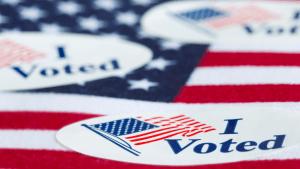AUM Poll examines GOP primary race for Alabama’s First Congressional District
 The latest AUM Poll from Auburn University at Montgomery’s Department of Political Science and Public Administration, in partnership with the Survey Research Center at the University of Georgia, shows Jerry Carl leading Barry Moore by eight percentage points heading into the March 5 Republican primary election for Alabama’s First Congressional District.
The latest AUM Poll from Auburn University at Montgomery’s Department of Political Science and Public Administration, in partnership with the Survey Research Center at the University of Georgia, shows Jerry Carl leading Barry Moore by eight percentage points heading into the March 5 Republican primary election for Alabama’s First Congressional District.
Read key polling insights: AUM Poll Toplines
The poll found that 43 percent of respondents plan to vote for Carl and 35 percent for Moore, with 22 percent undecided.
The Republican primary election for the First Congressional District is unusual since it features two sitting Republican members of the U.S. House of Representatives. These incumbents find themselves in a face-off due to a federal court order last year requiring the state to create a new majority-black congressional district.
Moore’s Second Congressional District, which once contained elements of the Wiregrass and the Montgomery metro area, was redrawn. Rather than seek reelection there, Moore chose to challenge Carl in his Gulf Coast district. While the new First Congressional District contains elements of both Carl and Moore’s old districts, Carl retained a larger share of his voters than did Moore.
Results from the AUM Poll indicate that Carl’s edge in retained voters offers him an edge in his contest with Moore. While 18 percent of respondents from Carl’s old district plan to vote for Moore, 17 percent of respondents from Moore’s old district plan to vote for Carl — outcomes that are largely off-setting.
Over the course of Carl and Moore’s campaign, the candidates have each fought to frame themselves as the more conservative candidate. Results from the AUM Poll indicate that voters see a difference between these individuals — differences that help to illuminate rates of popular support for either incumbent.
“Respondents certainly view Carl as the more moderate, more mainstream candidate in this race, and that perception is helping to sort voters into either his or Moore’s camp,” said David Hughes, associate professor of political science at AUM and director of the AUM Poll.
“Financial support to Ukraine, for example, is a dividing line in this race,” said Hughes. A total of 51 percent of survey respondents who said that U.S. funding to Ukraine was “about the right amount” supported Carl compared to only 25 percent who supported Moore (a 26-point difference).
Support for the former president, Donald Trump, also helps to explain voters’ backing for either Carl or Moore. A total of 52 percent of Republican respondents with a “very unfavorable” opinion of Trump expressed support for Carl compared to only 25 percent support for Moore (a 27-point difference).
Support for either candidate also appears to depend upon respondents’ religious views and community types. Voters who identified as being neither Evangelical nor a Born-Again Christian registered 45 percent support for Carl compared to only 27 percent support for Moore (an 18-point difference). And respondents who indicated living in a rural area expressed 42 percent support for Moore versus Carl’s 34 percent support (an 8-point difference), while voters who reported living in suburbs expressed 60 percent support for Carl compared to only 17 percent for Moore (a 43-point difference).
The AUM Poll was fielded on February 27. It consisted of a sample of 1,909 likely Republican voters for the March 5 primary (out of a total of 91,642 individuals contacted for a 2.1 percent response rate). Respondents were surveyed via text-to-web methods and were weighted according to their age, race, gender, and education. The poll has a margin of error (at 95 percent confidence) of ±2.2 percentage points.
